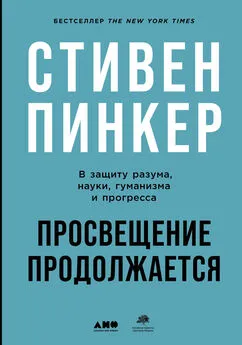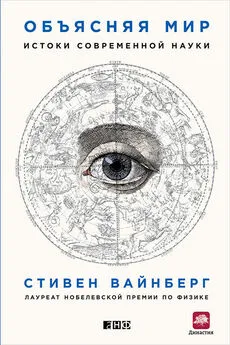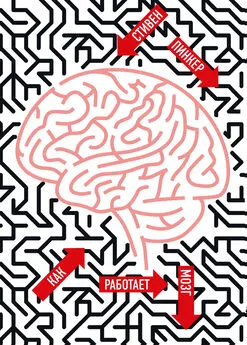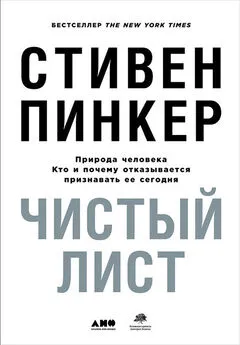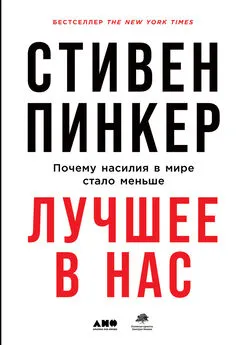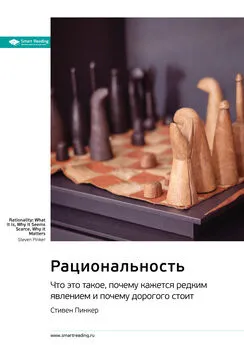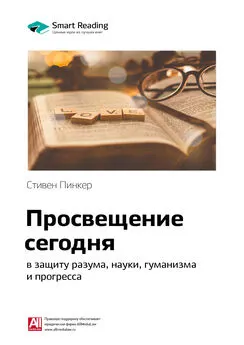Стивен Пинкер - Просвещение продолжается. В защиту разума, науки, гуманизма и прогресса
- Название:Просвещение продолжается. В защиту разума, науки, гуманизма и прогресса
- Автор:
- Жанр:
- Издательство:Альпина нон-фикшн
- Год:2021
- Город:Москва
- ISBN:9785001395362
- Рейтинг:
- Избранное:Добавить в избранное
-
Отзывы:
-
Ваша оценка:
Стивен Пинкер - Просвещение продолжается. В защиту разума, науки, гуманизма и прогресса краткое содержание
Этот прогресс – не случайность и не результат действия внешних сил. Это дар современному миру от деятелей Просвещения, которые первыми додумались, что знания можно использовать во имя процветания всего человечества. Идеи Просвещения – вовсе не наивные мечтания. Наоборот, они сработали – и это неоспоримый факт. Тем не менее именно сейчас эти идеи особенно нуждаются в нашей защите, поскольку противостоят характерным недостаткам человеческой природы – трайбализму, авторитаризму, демонизации чужаков и магическому мышлению, – которые так нравится эксплуатировать современным демагогам. Да, стоящие перед человечеством проблемы огромны, но все они решаемы, если мы, продолжая дело Просвещения, используем для этого разум, доверяем науке и руководствуемся идеалами гуманизма.
Особенности
Более 70 графиков из почти всех областей человеческой жизни.
Для кого
Для поклонников Стивена Пинкера. Для всех, кто интересуется природой человека. Для тех, кто верит в прогресс, и для тех, кто в нем сомневается.
Просвещение продолжается. В защиту разума, науки, гуманизма и прогресса - читать онлайн бесплатно ознакомительный отрывок
Интервал:
Закладка:
Centers for Disease Control. 2015. Injury prevention and control: Data and statistics (WISQARS). https://www.cdc.gov/injury/wisqars/.
Central Intelligence Agency. 2016. The world factbook. https://www.cia.gov/library/publications/the-world-actbook/.
Chalk, F., & Jonassohn, K. 1990. The history and sociology of genocide: Analyses and case studies . New Haven: Yale University Press.
Chalmers, D. J. 1996. The conscious mind: In search of a fundamental theory . New York: Oxford University Press.
Chang, L. T. 2009. Factory girls: From village to city in a changing China. New York: Spiegel & Grau.
Chen, D. H. C., & Dahlman, C. J. 2006. The knowledge economy, the KAM methodology and World Bank operations . Washington: World Bank. http://documents.worldbank.org/curated/en/695211468153873436/The-knowledge-economy-the-KAM-methodology-and-World-Bank-operations.
Chenoweth, E. 2016. Why is nonviolent resistance on the rise? Diplomatic Courier . http://www.diplomaticourier.com/2016/06/28/nonviolent-resistance-rise/.
Chenoweth, E., & Stephan, M. J. 2011. Why civil resistance works: The strategic logic of nonviolent conflict . New York: Columbia University Press.
Chernew, M., Cutler, D. M., Ghosh, K., & Landrum, M. B. 2016. Understanding the improvement in disability free life expectancy in the U.S. elderly population . Cambridge, MA: National Bureau of Economic Research.
Chirot, D. 1994. Modern tyrants . Princeton, NJ: Princeton University Press.
Cipolla, C. 1994. Before the Industrial Revolution: European society and economy, 1000–1700 (3rd ed.). New York: Norton.
Clark, A. M., & Sikkink, K. 2013. Information effects and human rights data: Is the good news about increased human rights information bad news for human rights measures? Human Rights Quarterly, 35, 539–68.
Clark, D. M. T., Loxton, N. J., & Tobin, S. J. 2015. Declining loneliness over time: Evidence from American colleges and high schools. Personality and Social Psychology Bulletin, 41, 78–89.
Clark, G. 2007. A farewell to alms: A brief economic history of the world . Princeton, NJ: Princeton University Press.
Cohen, G. L. 2003. Party over policy: The dominating impact of group influence on political beliefs. Journal of Personality and Social Psychology, 85, 808–22.
Collier, P. 2007. The bottom billion: Why the poorest countries are failing and what can be done about it . New York: Oxford University Press.
Collier, P., & Rohner, D. 2008. Democracy, development and conflict. Journal of the European Economic Association, 6, 531–40.
Collini, S. 1998. Introduction. In C. P. Snow, The two cultures . New York: Cambridge University Press.
Collini, S. 2013. Introduction. In F. R. Leavis, Two cultures? The significance of C. P. Snow . New York: Cambridge University Press.
Combs, B., & Slovic, P. 1979. Newspaper coverage of causes of death. Journalism Quarterly, 56, 837–43.
Connor, S. 2014. The horror of number: Can humans learn to count? Paper presented at the Alexander Lecture. http://stevenconnor.com/horror.html.
Connor, S. 2016. Living by numbers: In defence of quantity . London: Reaktion Books.
Conrad, S. 2012. Enlightenment in global history: A historiographical critique. American Historical Review, 117, 999–1027.
Cook, M. 2014. Ancient religions, modern politics: The Islamic case in comparative perspective . Princeton, NJ: Princeton University Press.
Coontz, S. 1992/2016. The way we never were: American families and the nostalgia trap (rev. ed.). New York: Basic Books.
Corlett, A. 2016. Examining an elephant: Globalisation and the lower middle class of the rich world . London: Resolution Foundation.
Cornwall Alliance for the Stewardship of Creation. 2000. The Cornwall Declaration on Environmental Stewardship. http://cornwallalliance.org/landmark-documents/the-cornwall-declaration-on-environmental-stewardship/.
Cosmides, L., & Tooby, J. 1992. Cognitive adaptations for social exchange. In J. H. Barkow, L. Cosmides, & J. Tooby, eds., The adapted mind: Evolutionary psychology and the generation of culture. New York: Oxford University Press.
Costa, D. L. 1998. The evolution of retirement: An American economic history, 1880–1990 . Chicago: University of Chicago Press.
Costa, P. T., & McCrae, R. R. 1982. An approach to the attribution of aging, period, and cohort effects. Psychological Bulletin, 92, 238–50.
Costello, E. J., Erkanli, A., & Angold, A. 2006. Is there an epidemic of child or adolescent depression? Journal of Child Psychology and Psychiatry, 47, 1263–71.
Costello, M. J., May, R. M., & Stork, N. E. 2013. Can we name Earth’s species before they go extinct? Science, 339, 413–16.
Council for Secular Humanism. 1980. A Secular Humanist Declaration. https://www.secularhumanism.org/index.php/11.
Council for Secular Humanism. 2000. Humanist Manifesto 2000. https://www.secularhumanism.org/index.php/1169.
Council on Foreign Relations. 2011. World opinion on human rights. Public Opinion on Global Issues . https://www.cfr.org/backgrounder/world-opinion-human-rights.
Council on Foreign Relations. 2012. World opinion on transnational threats: Weapons of mass destruction. Public Opinion on Global Issues . http://www.cfr.org/thinktank/iigg/pop/.
Courtois, S., Werth, N., Panné, J.-L., Paczkowski, A., Bartosek, K., et al. 1999. The Black Book of Communism: Crimes, terror, repression . Cambridge, MA: Harvard University Press.
Courtwright, D. 2010. No right turn: Conservative politics in a liberal America . Cambridge, MA: Harvard University Press.
Cowen, T. 2017. The complacent class: The self efeating quest for the American dream . New York: St. Martin’s Press.
Coyne, J. A. 2015. Faith versus fact: Why science and religion are incompatible . New York: Penguin.
Cravens, G. 2007. Power to save the world: The truth about nuclear energy. New York: Knopf.
Cronin, A. K. 2009. How terrorism ends: Understanding the decline and demise of terrorist campaigns . Prince ton, NJ: Princeton University Press.
Cronon, W. 1995. The trouble with wilderness; or, getting back to the wrong nature. In W. Cronon, ed., Uncommon ground: Rethinking the human place in nature . New York: Norton.
Cunningham, H. 1996. Combating child labour: The British experience. In H. Cunningham & P. P. Viazzo, eds., Child labour in historical perspective, 1800–1985: Case studies from Europe, Japan, and Colombia . Florence: UNICEF.
Cunningham, T. J., Croft, J. B., Liu, Y., Lu, H., Eke, P. I., et al. 2017. Vital signs: Racial disparities in age pecific mortality among Blacks or African Americans – United States, 1999–2015. Morbidity and Mortality Weekly Report, 66, 444–56.
Daly, M. C., Oswald, A. J., Wilson, D., & Wu, S. 2010. The happiness uicide paradox. Federal Reserve Bank of San Francisco Working Papers, 2010 .
Davis, B. D. 1983. Neo ysenkoism, IQ, and the press. Public Interest, 73, 41–59.
Davis, E., & Marcus, G. F. 2015. Commonsense reasoning and commonsense knowledge in artificial intelligence. Communications of the ACM, 58, 92–103.
Dawes, R. M., Faust, D., & Meehl, P. E. 1989. Clinical versus actuarial judgment. Science, 243, 1668–74.
Dawkins, R. 1976/1989. The selfish gene (new ed.). New York: Oxford University Press.
Dawkins, R. 1983. Universal Darwinism. In D. S. Bendall, ed., Evolution from molecules to man . New York: Cambridge University Press.
Dawkins, R. 1986. The blind watchmaker: Why the evidence of evolution reveals a universe without design. New York: Norton.
Dawkins, R. 2006. The God delusion . New York: Houghton Mifflin.
de Lazari-Radek, K., & Singer, P. 2012. The objectivity of ethics and the unity of practical reason. Ethics, 123, 9–31.
de Ribera, O. S., Kavish, B., & Boutwell, B. B. 2017. On the relationship between psychopathy and general intelligence: A meta nalytic review. bioRχiv , doi: https://doi.org/10.1101/100693.
Deary, I. J. 2001. Intelligence: A very short introduction . New York: Oxford University Press.
Death Penalty Information Center. 2017. Facts about the death penalty. http://www.deathpenaltyinfo.org/documents/FactSheet.pdf.
Deaton, A. 2011. The financial crisis and the well eing of Americans. Oxford Economic Papers, 1–26.
Deaton, A. 2013. The Great Escape: Health, wealth, and the origins of inequality . Princeton, NJ: Prince ton University Press.
Deaton, A. 2017. Thinking about inequality. Cato’s Letter, 15, 1–5.
Deep Decarbonization Pathways Project 2015. Pathways to deep decarbonization . Paris: Institute for Sustainable Development and International Relations.
DeFries, R. 2014. The big ratchet: How humanity thrives in the face of natural crisis . New York: Basic Books.
Degler, C. N. 1991. In search of human nature: The decline and revival of Darwinism in American social thought . New York: Oxford University Press.
Dehaene, S. 2009. Signatures of consciousness. Edge . http://www.edge.org/3rd/culture/dehaene09/dehaene09index.html.
Dehaene, S., & Changeux, J.-P. 2011. Experimental and theoretical approaches to conscious processing. Neuron, 70, 200–227.
Delamontagne, R. G. 2010. High religiosity and societal dysfunction in the United States during the first decade of the twenty rst century. Evolutionary Psychology, 8, 617–57.
Denkenberger, D., & Pearce, J. 2015. Feeding every one no matter what: Managing food security after global catastrophe . New York: Academic Press.
Dennett, D. C. 2006. Breaking the spell: Religion as a natural phenomenon . New York: Penguin Books.
DeScioli, P. 2016. The side aking hypothesis for moral judgment. Current Opinion in Psychology, 7, 23–27.
DeScioli, P., & Kurzban, R. 2009. Mysteries of morality. Cognition, 112, 281–99.
Desvousges, W. H., Johnson, F. R., Dunford, R. W., Boyle, K. J., Hudson, S. P., et al. 1992. Measuring nonuse damages using contingent valuation: An experimental evaluation of accuracy . Research Triangle Park, NC: RTI International.
Deutsch, D. 2011. The beginning of infinity: Explanations that transform the world . New York: Viking.
Devereux, S. 2000. Famine in the twentieth century . Sussex, UK: Institute of Development Studies. http://www.ids.ac.uk/publication/famine-in-the-twentieth-century.
Diamandis, P., & Kotler, S. 2012. Abundance: The future is better than you think . New York: Free Press.
Diamond, J. M. 1997. Guns, germs, and steel: The fates of human societies . New York: Norton.
Dinda, S. 2004. Environmental Kuznets curve hypothesis: A survey. Ecological Economics, 49, 431–55.
Dobbs, R., Madgavkar, A., Manyika, J., Woetzel, J., Bughin, J., et al. 2016. Poorer than their parents? Flat or falling incomes in advanced economies. McKinsey Global Institute.
Dreger, A. 2007. The controversy surrounding “The man who would be queen”: A case history of the politics of science, identity, and sex in the Internet age. Archives of Sexual Behavior, 37, 366–421.
Dreger, A. 2015. Galileo’s middle finger: Heretics, activists, and the search for justice in science . New York: Penguin.
Читать дальшеИнтервал:
Закладка:
